Bristol Refugee Artists Collective is a group of artists from different countries, cultures and languages, all of whom have found a home in Bristol and who share a passion for creativity and a love of the universal language of art.
During the summer of 2025, BRAC received an invitation to create some artwork by Glastonbury Festival. The artists split into two teams — one created a banner entitled ‘Friendship Island’, (pictured above) in response to Keir Starmer’s comments about the UK becoming an “island of strangers”, which left many feeling unwelcome and unwanted. The other team chose to focus on the humanitarian catastrophe unfolding in Sudan.
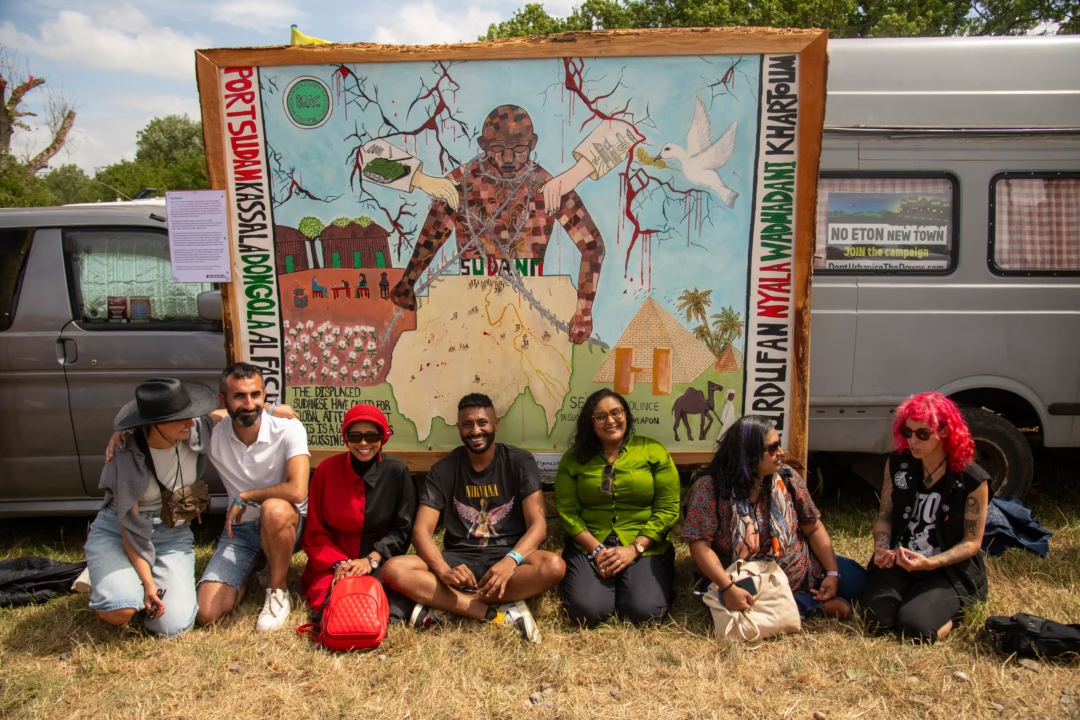
The banners reflect messages of welcome, belonging, and mutual respect, a reminder that our strength lies not in closing off, but in reaching out. The members of BRAC wanted to speak to Britain’s real identity — diverse, open, and enriched by generations of migrants who have helped shape its culture, economy, and future.
Their message: unity is not about sameness, but about shared humanity. Their artwork is a call to celebrate contribution over division, and to recognise that our differences make the UK stronger, not weaker.
Meet some of the artists from BRAC
Rosa Michellon
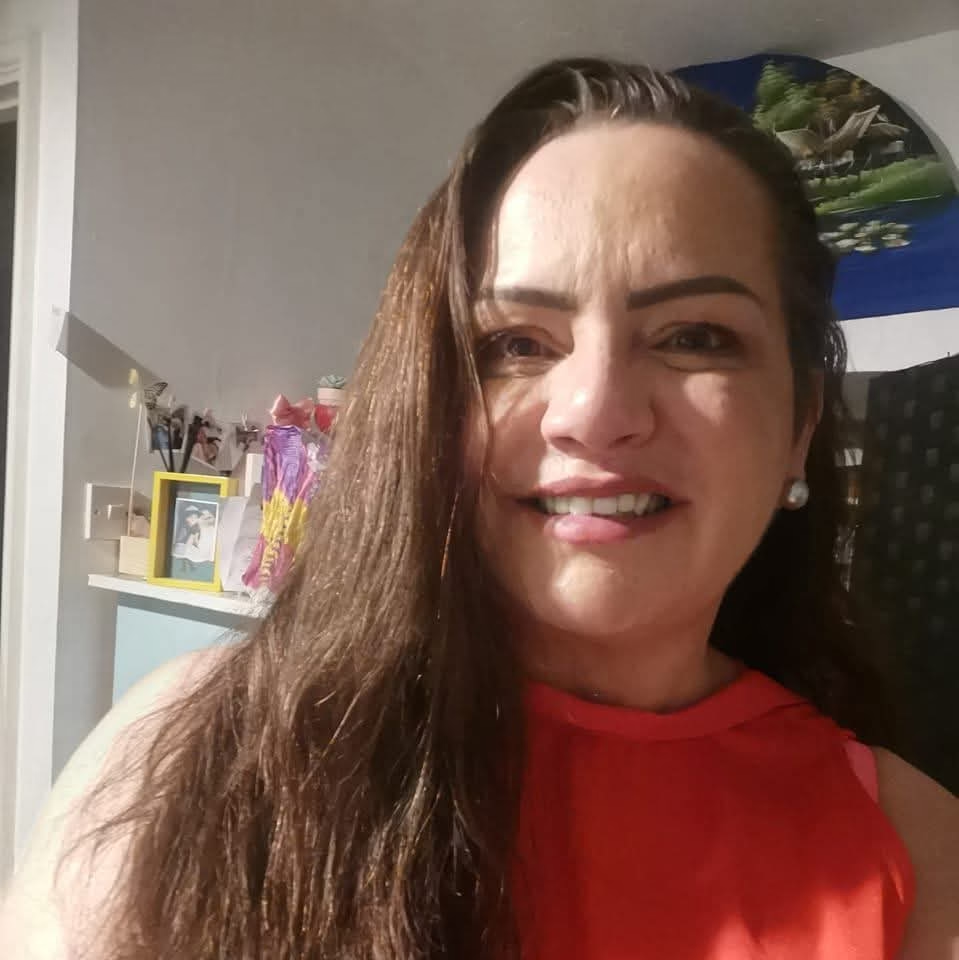
Rosa Michellon was born to an Italian father and Brazilian mother. At age seven, she accompanied her mother to a fabric painting course—an experience that sparked her love of colour and set her on a path into the arts.
A self-taught artist, Rosa drew inspiration from figures like Pollock, Pasinetti, Fontana, and Giuliano Ottaviani. Through experimentation, she learned to mix colours, refine her palette, and shape her artistic identity.
In Brazil, she created a body of figurative, still life, and abstract works, one of which was selected for Artexpo Salvador, curated by Lita Limley. After moving to Italy, she exhibited alongside renowned artists Ottaviani and Pasinetti, and later showed her piece Faces in the Dark at Artexpo Basel in Switzerland.
What does belonging mean to me?

For me, belonging is being able to look around and feel at home, and being able to smile without fear of judgment.
Belonging means living in harmony with people from different cultures and religions. It means treating others as I’d like to be treated, and being able to comfort those around me. It is feeling part of a family in a city where I don’t know anyone and being sure that I am welcomed wherever I go.
Though the world may be vast, chaotic and mysterious, I try to find happiness through the belief that a thousand adventures still await me. I believe that love will always prevail, and there will always be somewhere I belong.
Habibur Rahman

Habibur Rahman is a visual artist from Bangladesh who has lived in Bristol for the past 12 years. Working primarily in acrylic and oil on canvas, his art explores themes of migration, memory, cultural identity, and emotion.
He is a founding member of BRAC, a platform that has enabled him to share his journey as a migrant artist and connect with creatives from diverse backgrounds. Alongside his artistic practice, he runs Naan & Co, a family-owned Indian and Bangladeshi restaurant in Clifton.
Through both his artwork and his restaurant, Habibur tells stories of home, identity, and cultural connection.
What does belonging mean to me?
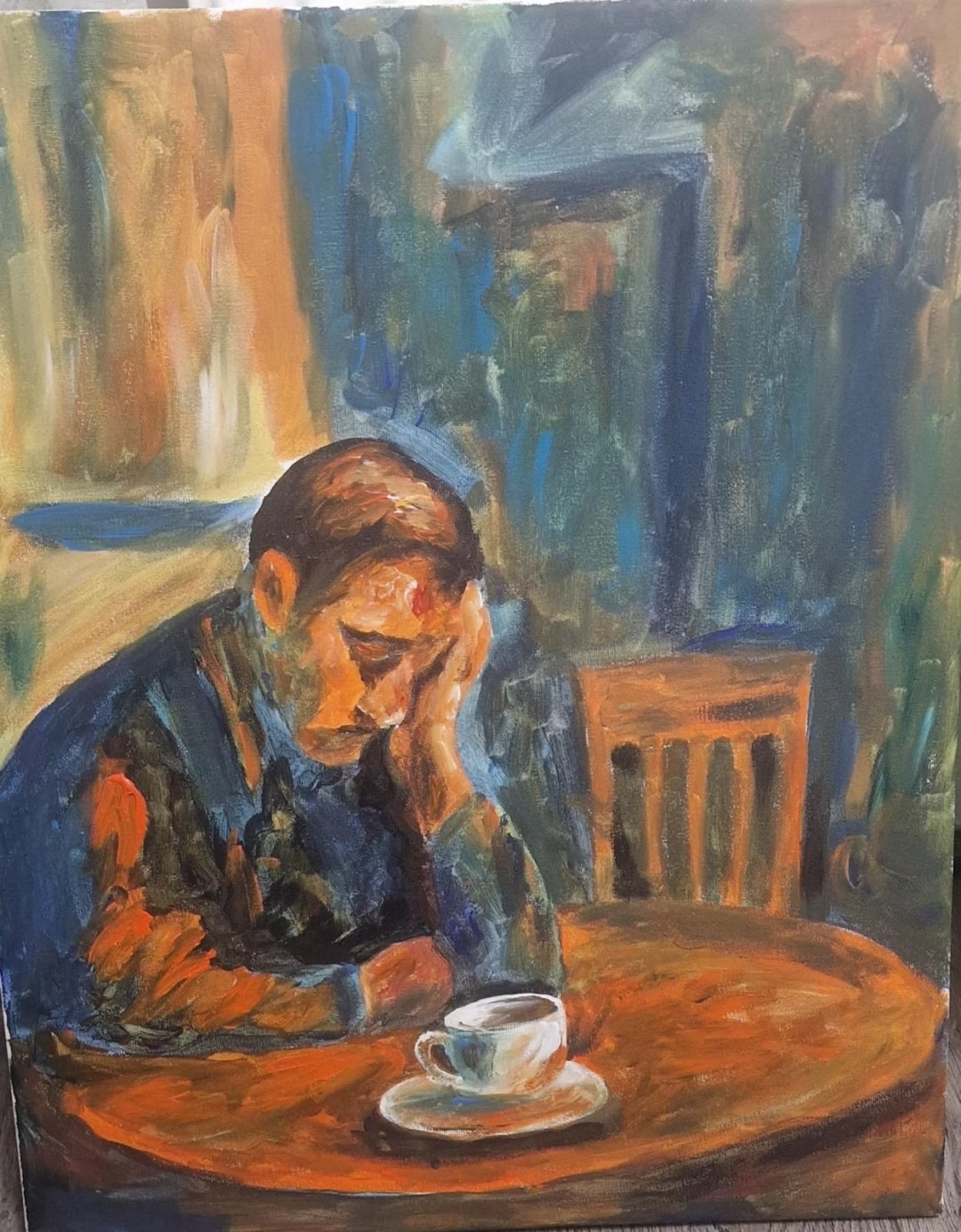
To me, belonging is something we build. As a migrant, I’ve learnt that belonging is not just about where you live, but how you connect – with people, with memories, and with your own culture.
Painting and food are two powerful ways I express myself. They help me honour my Bangladeshi roots and feel connected to my life here in Bristol. Belonging grows through small moments – the comfort of a shared meal, the peace I experience when creating art, or the feeling of being accepted. Bristol has given me the space to share my voice and to feel rooted.
My painting shows a person sitting at a table with a cup of coffee. It reflects the emotional space many migrants experience – a moment of quiet, where past and present come together. The coffee represents comfort, grounding, and routine. For me, this painting expresses how belonging can be found not just in big events, but in small personal rituals – the quiet moments when we feel most like ourselves.
Isra Elhag

Isra Elhag is an artist known for her powerful works that celebrate and preserve Africa’s rich cultural heritage. Born and raised in Qatar, she studied in Sudan and later lived in Sweden. From an early age, she developed a passion for art and African culture, eventually shaping a distinctive style that fuses traditional motifs with a modern aesthetic.
Her work explores identity, emotion, and the experiences of the African diaspora. Committed to nurturing creative talent, Isra has led numerous art workshops for children and young people. Through her practice, she continues to showcase the beauty and diversity of African culture, inspiring a new generation of artists and art lovers.
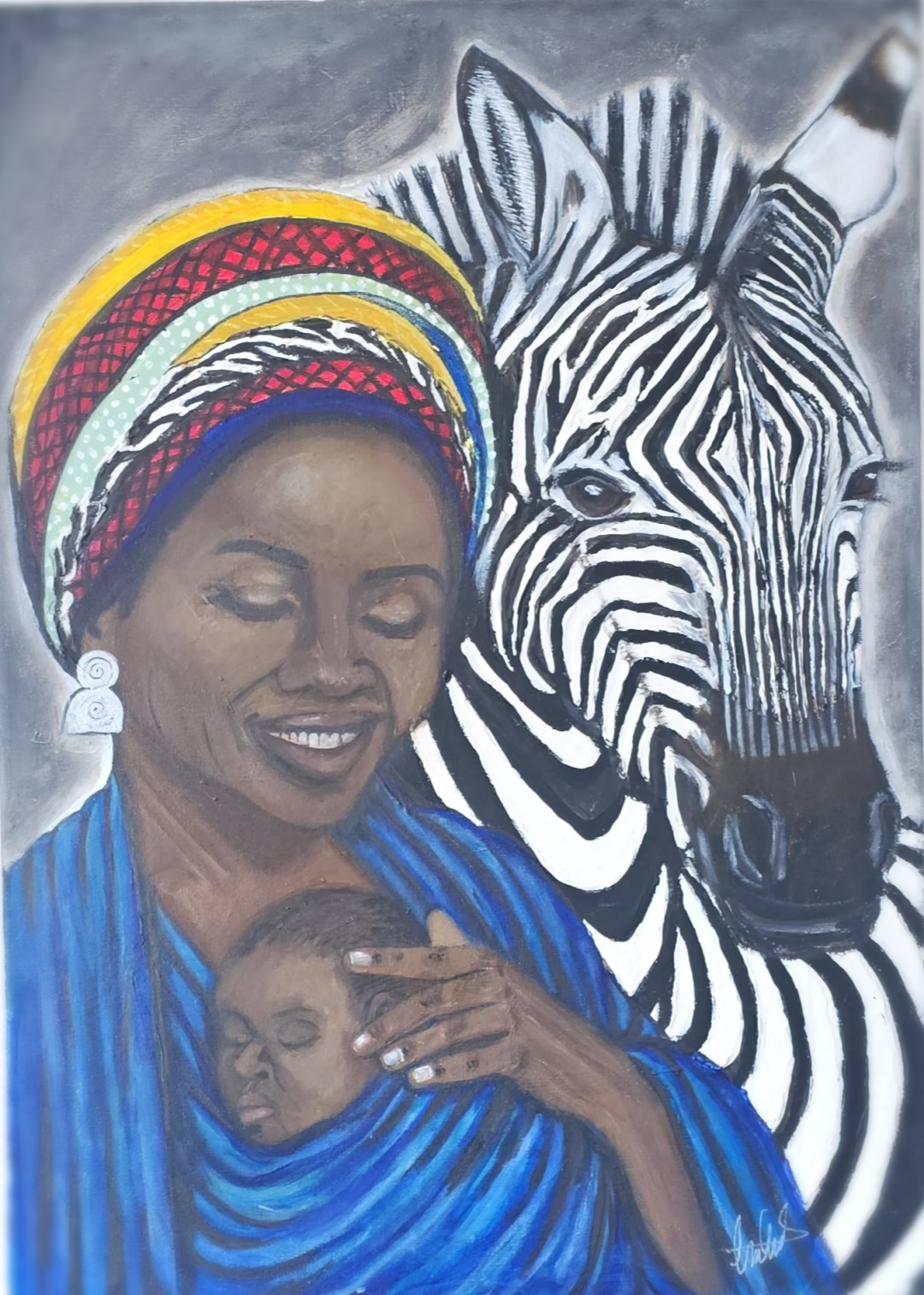
What does belonging mean to me?
Belonging is the warmth of shared rhythms where skin, soul, and spirit meet. It’s the tender bond between mother and child, echoing through the generations and the clothes that we wear. Belonging is where we are seen, held, and remembered. It’s the feeling of being accepted, loved and valued just the way we are.
Brândușa Andreea Rotaru

Brândușa – also known as Shika Otalu – was born in Romania and has been making art since her early childhood. As soon as she felt called to be an artist, she took the first step and trained as a combined arts worker. She moved to Bristol three years ago with a mission to create art in the community and use it as a way to speak up, to unite, and to inspire. She has been a member of BRAC for a year and a half.
Her favourite medium to work with is textile, which she uses to create intuitive art, often inspired by sacred geometry. She uses upcycled fabric where possible to raise awareness about how our consumer choices affect the Earth. Alongside her artwork, she facilitates workshops, either independently or with collaborators such as Arnolfini, Bristol Refugee Festival and RWA.
What does belonging mean to me?
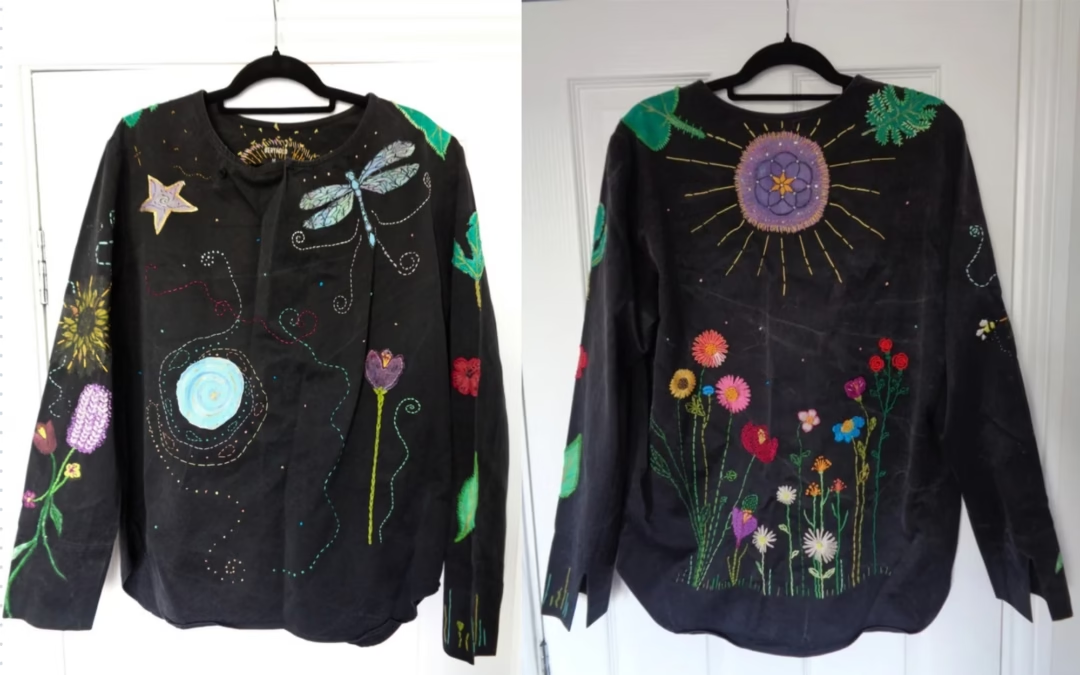
Belonging comes from surrendering and allowing life to love and protect us, knowing we are home wherever our head rests at night. We have a right to be here and a responsibility to nurture and protect the elements of life, including the land that feeds us, the animals that teach us, and every other being on this planet.
Belonging relies on acceptance, on unconditional love. I found this in many places, including Bristol – a place of synchronicities and challenges that helped me face my fears and my heart’s deepest desires.
Belonging starts with embracing who we are: if we truly accept ourselves, our hearts will guide us to where we need to be. I am grateful to the beautiful community of Bristol that keeps the love alive, to anyone showing up at protests or simply creating safe spaces for expression. You healed parts of my heart by welcoming me here.
Sherin Ali
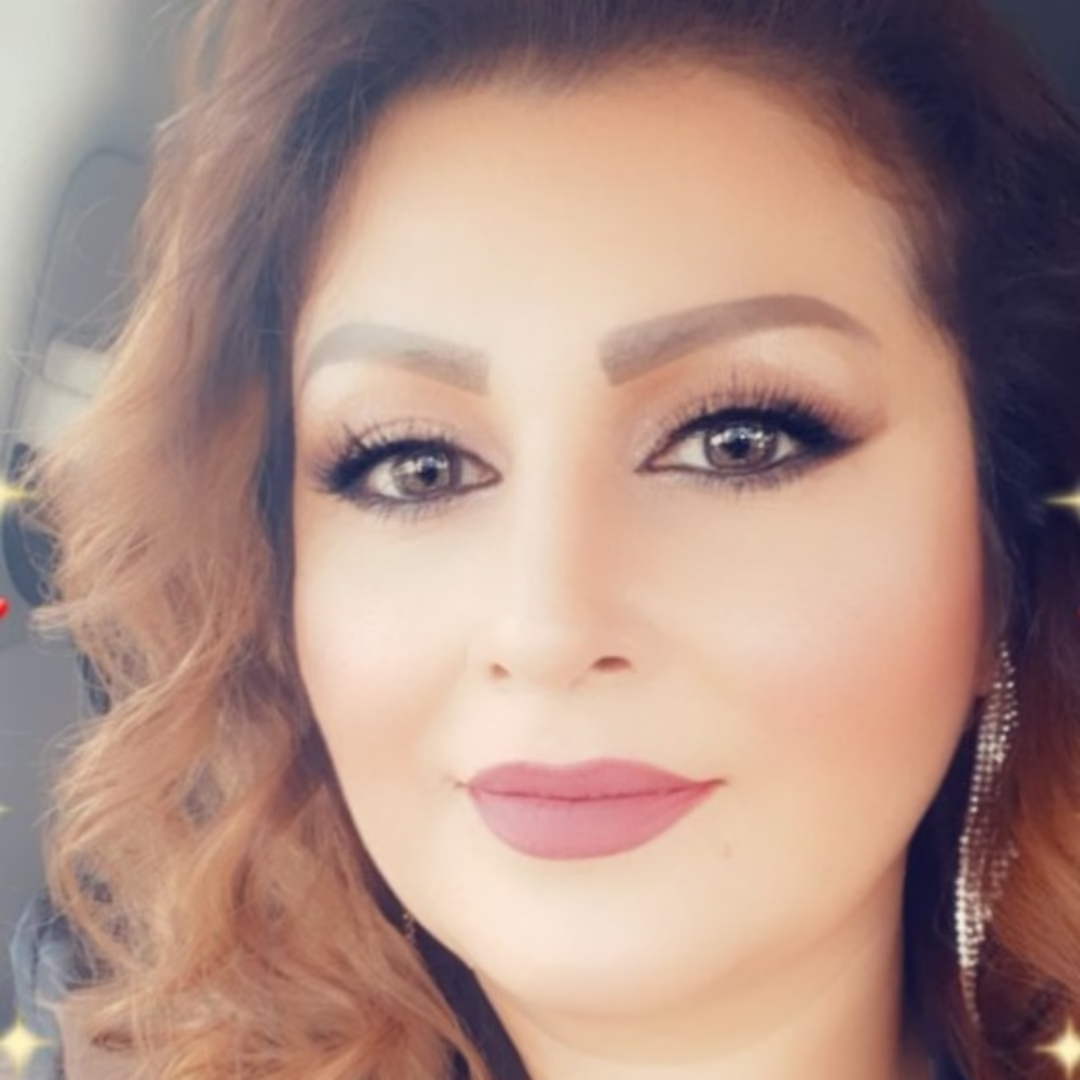
Sherin Ali is a Kurdish artist from Syria who came to England in 2012 following the outbreak of the civil war. Her work explores Kurdish identity, reflects on the suffering of her homeland, and shares her experiences as a refugee.
A member of BRAC for the past two years, she has also showcased her art through collaborations with the University of the West of England (UWE).
What does belonging mean to me?
Belonging and citizenship are the essence of identity and vital elements in building a society characterised by peace and cooperation. A sense of belonging, responsibility, and loyalty to one’s homeland creates the foundation of a good life. When these qualities emerge, they strengthen social bonds and deepen human relationships, providing us with a sense of security and psychological stability.
Our connection to community enhances our sense of independence and dignity, contributes to strengthening our self-confidence, and motivates us to participate effectively in building and developing society.
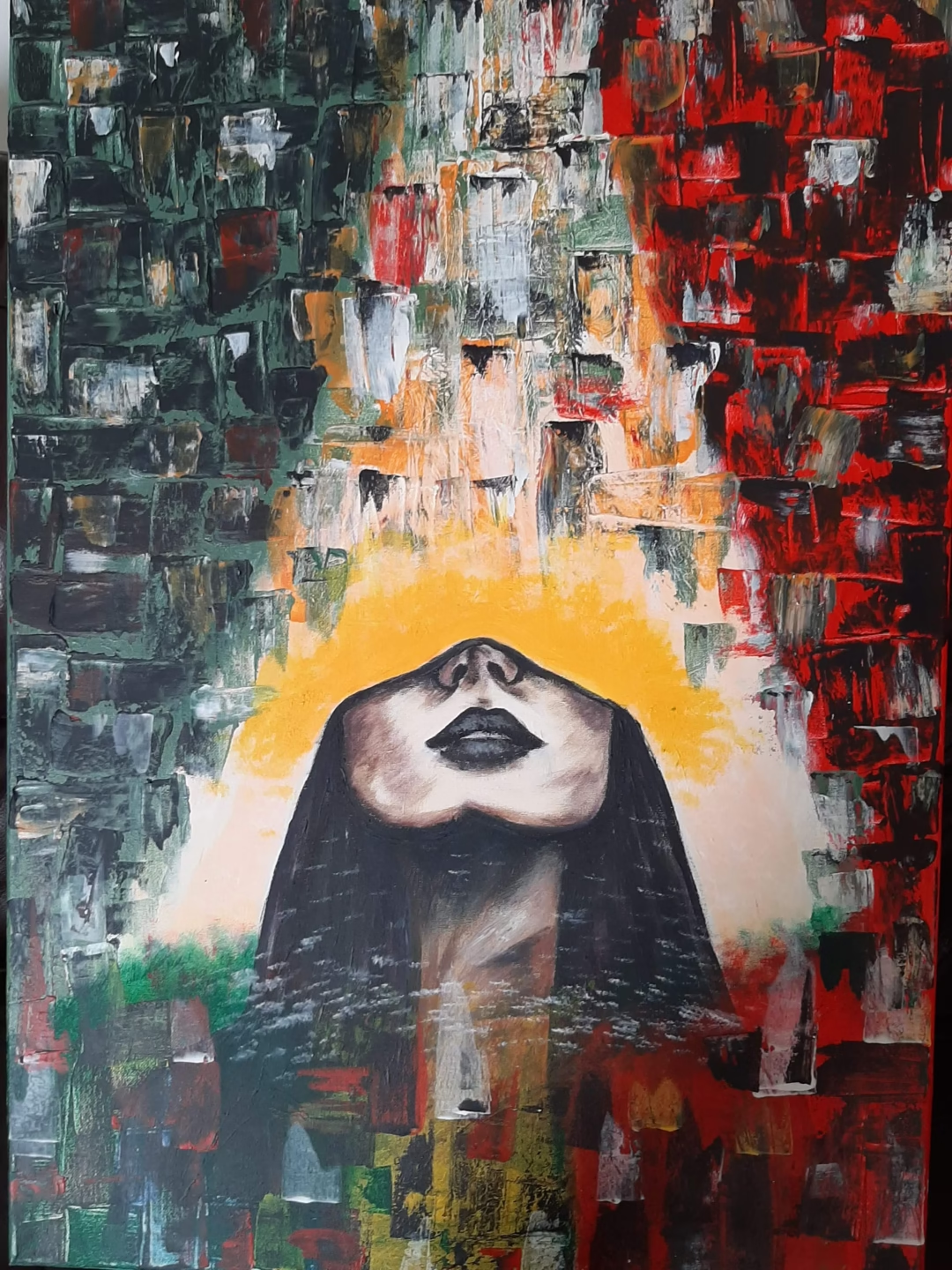
My painting expresses the Kurdish dream that vanished during the war, after the seizure of our land in Afrin. The colours represent the Kurdish flag and the land.
Sherien Elsheikh

Sherien Elsheikh has been actively engaging with refugees and asylum seekers for several years. She works as the Drop-in Assistant for Refugee Women of Bristol and is also an ambassador and producer for the Bristol Refugee Festival.
Born in Libya and raised in Sudan, Sherien has studied graphic design, interior design, and photography. From 2021 to 2022, she worked on the Spike Print Studio’s Home Print Packs and the Mobile Print Project. She has delivered printmaking, embroidery, and textiles workshops at the Arnolfini, with Bristol MIND for refugees living in hotels, and during several Celebrating Sanctuary events for the Bristol Refugee Festival. Additionally, Sherien provides Arabic translation for workshop participants.
Currently, she is facilitating and coordinating an art workshop focused on wellbeing. Through her work, she explores her African culture through the use of strong colours, allowing her to express herself and reflecting her life experiences and cultural background.
What does belonging mean to me?
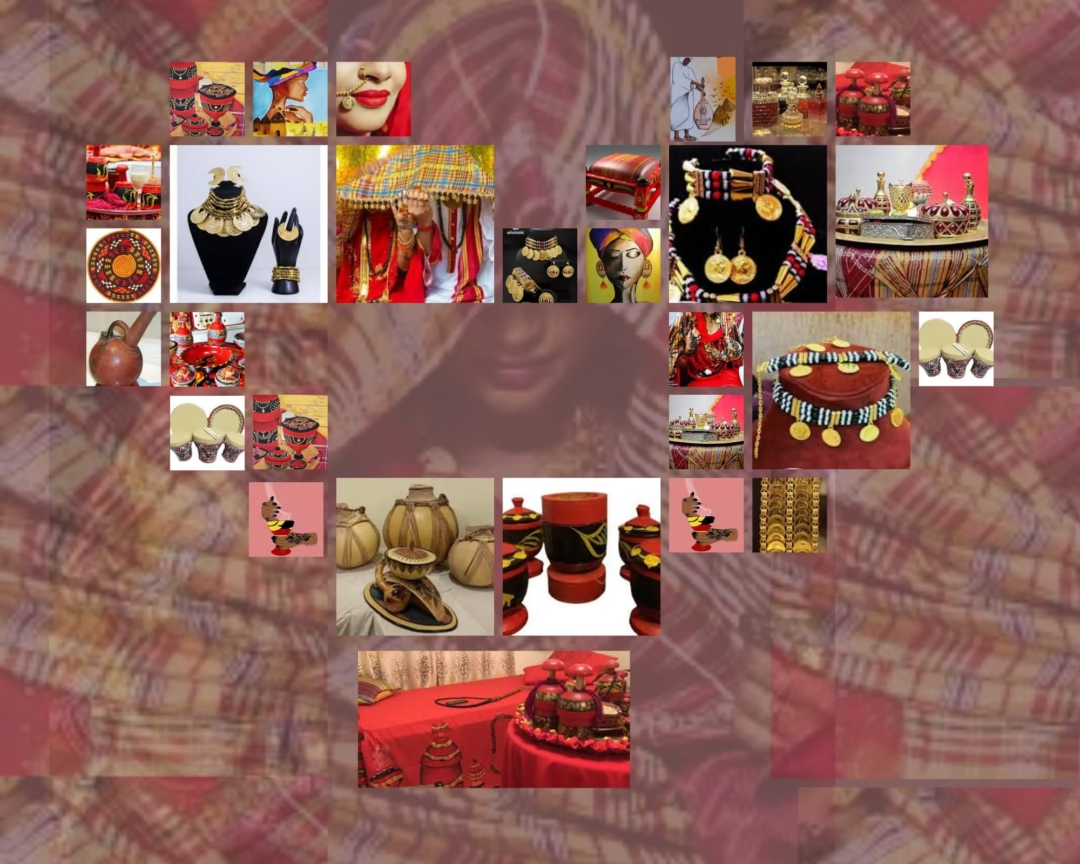
Belonging isn’t always immediate — it grows. The more time you spend in a place, the more memories, routines, and relationships begin to take root. Being in Bristol for a long time has given me a sense of familiarity and connection. It’s not just the city itself, but the way its streets, sounds, and spaces have become part of my story.
The people around me shape how safe and welcomed I feel. I belong when I’m surrounded by those who are genuine and kind, nonjudgmental, willing to understand my background, culture and journey. People I can laugh with, share with, or just be silent with — without pressure.
To me, belonging is more than just fitting in — it’s about feeling grounded. Belonging means knowing that I don’t have to change who I am to be accepted. It’s the feeling that I matter here, that I’m seen, and that I can relax into my own skin.
My artwork:
This piece tells the story of love and weddings in Sudan. I used materials typically used during weddings, called garmases, along with photos of the equipment used to apply perfume and oils. I also incorporated some of my artwork and traditional accessories into the piece.
Sayambrita Mukherjee

Sayambrita is a mixed media visual artist. She grew up in different parts of India, an experience that gave her an appreciation of different cultures. She first studied Economics, but knew in her heart that she needed to tread the unconventional path.
After working as a graphic designer, website content manager, teacher and facilitator, she began her journey as a visual artist, working with canvas, acrylic, clay and textile. Her creative journey is based on community engagement and social impact, along with mental wellbeing. It is also how she expresses grief and loss.
She has been in Bristol for almost 8 years, and her experiences here have fed into her artwork. Her first creative opportunity was from Creativity Works in Bath, where she facilitated her first wellbeing creative session with a group. As well as being a member of BRAC, she is a member of the Diverse Artists Network and has represented them on various projects. She has been a part of Bristol Refugee Festival, where she ran creative workshops, and recently completed a year and a half of her upcycled textile group ‘Community Threads’. She feels drawn to slow stitching and embroidery, which has been the dominant medium of her work in this exhibition.
What does belonging mean to me?
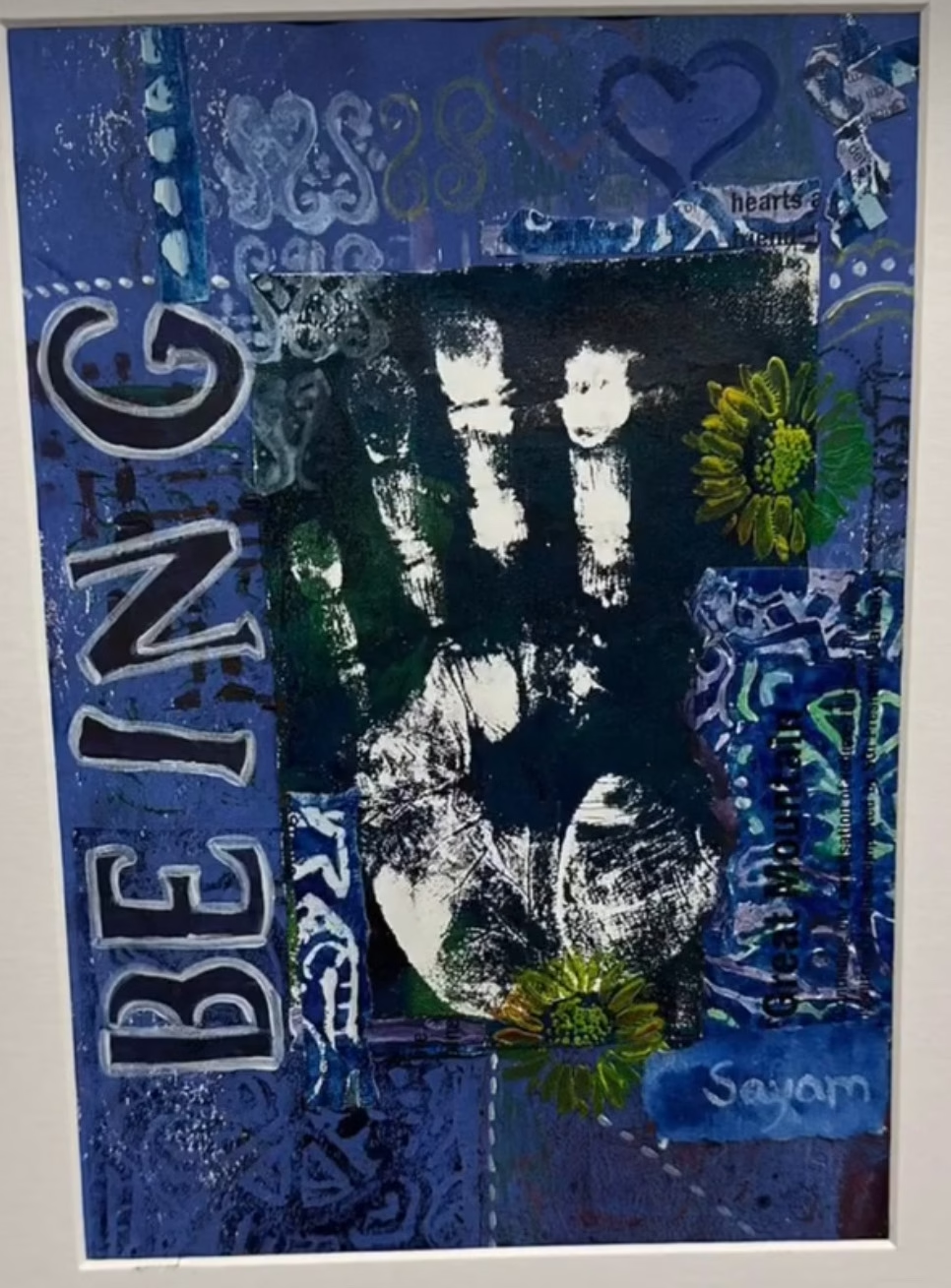
Being an immigrant, the feeling of belonging and finding a place of real comfort has been difficult to achieve. It isn’t just about where you live but whether you feel seen, wanted, valued, and secure in that place — practically, socially, emotionally, and legally.
Independent. Investigative. Indispensable.
Investigative journalism strengthens democracy – it’s a necessity, not a luxury.
The Cable is Bristol’s independent, investigative newsroom. Owned and steered by more than 2,600 members, we produce award-winning journalism that digs deep into what’s happening in Bristol.
We are on a mission to become sustainable, and to do that we need more members. Will you help us get there?
Join the Cable today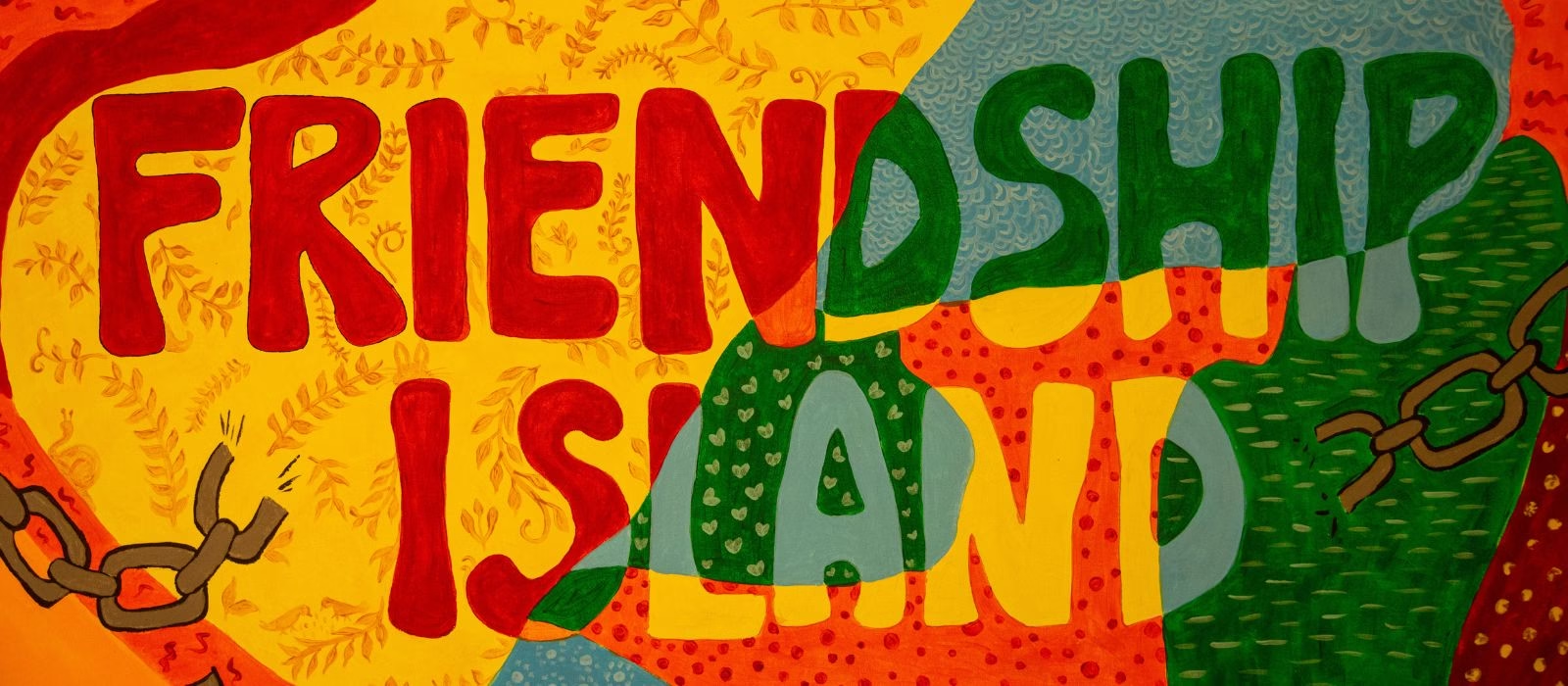

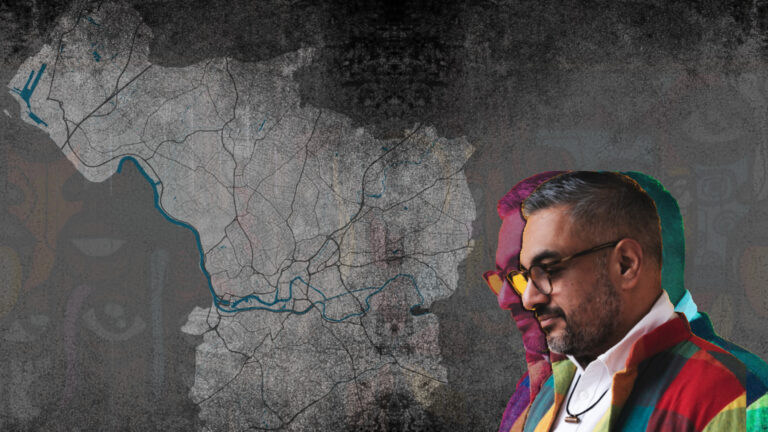
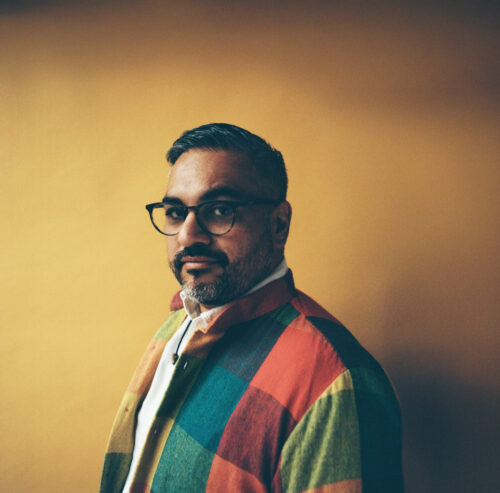
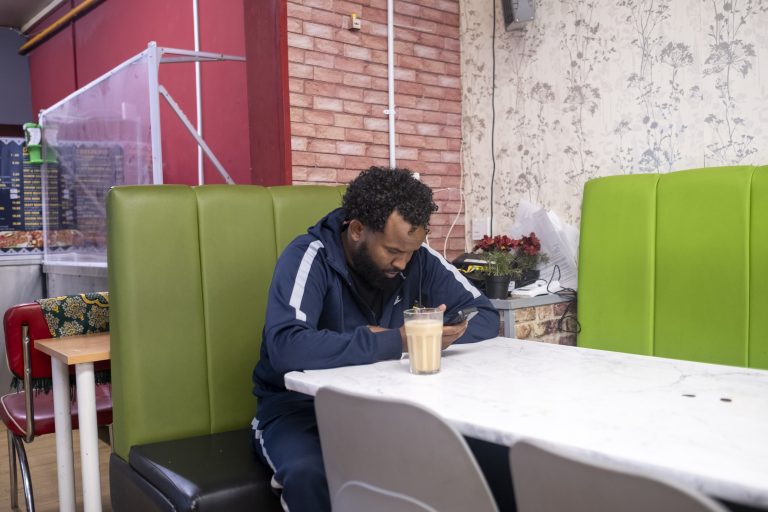
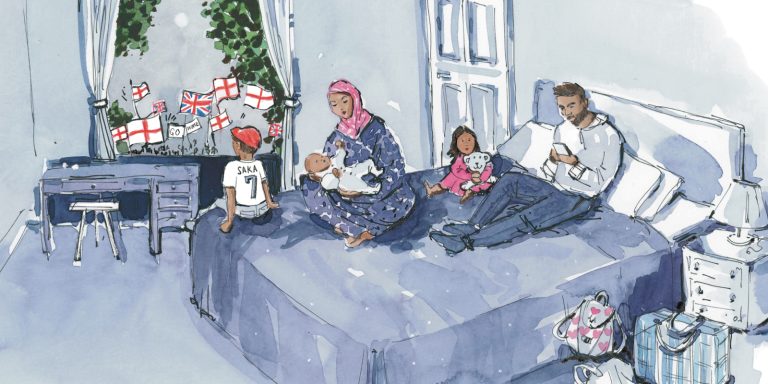

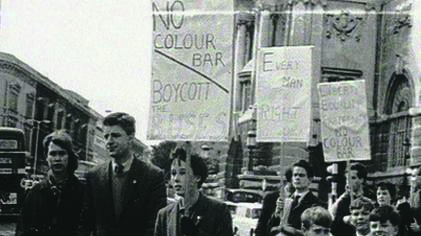
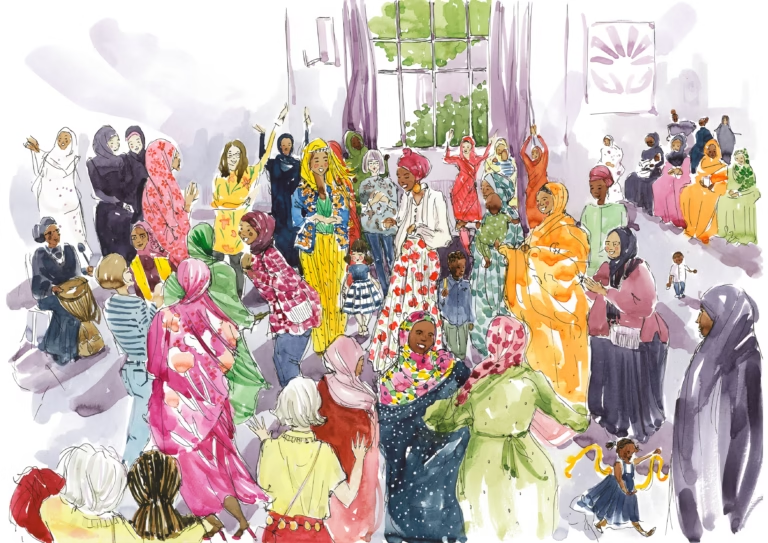
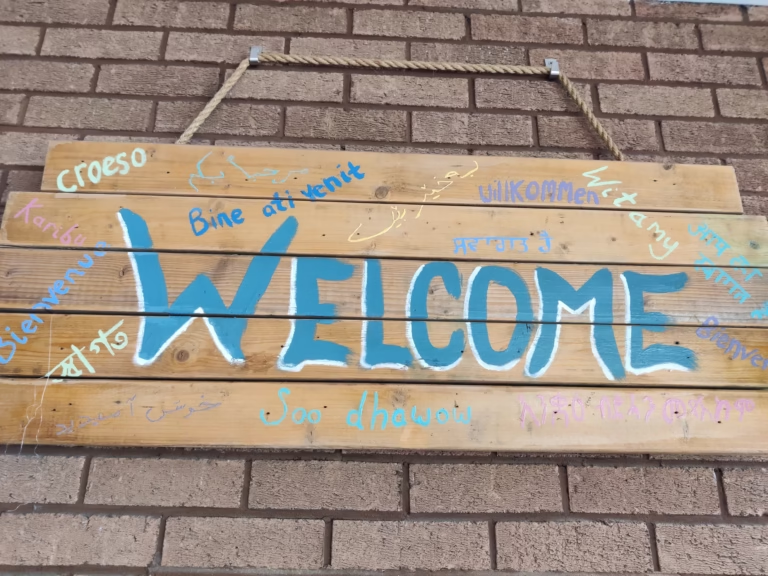
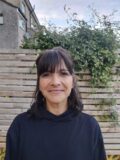

Report a comment. Comments are moderated according to our Comment Policy.
Nice article loved the images very powerful great work